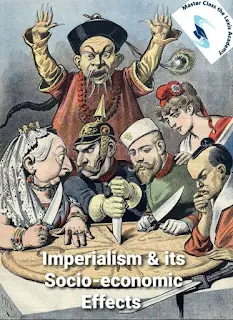Imperialism and Its Socioeconomic & Political Effects
Imperialism, a phenomenon that reached its zenith in the late 19th and early 20th centuries, refers to the extension of a nation's power and influence through various means, including military conquest, economic dominance, and cultural assimilation. This complex geopolitical practice was driven by a confluence of economic, political, and social factors, shaping the destinies of nations across the globe.
Economically, imperialism was often fueled by the desire for resources and markets. European powers, in particular, sought to secure raw materials for their industries and new markets for their products. This economic imperative led to the establishment of colonies and the exploitation of indigenous resources, creating intricate webs of economic interdependence between imperial powers and their colonies.
Politically, the quest for power and geopolitical advantage played a pivotal role in the imperialistic endeavors of nations. The acquisition of colonies was seen as a means to enhance a nation's prestige and strengthen its geopolitical position. Competition among European powers for colonial possessions resulted in conflicts and power struggles, such as the Scramble for Africa and the carving up of Asia through spheres of influence.
Socially, imperialism had profound and often detrimental effects on colonized societies. Cultural assimilation, imposition of foreign values, and the disruption of traditional ways of life were common consequences. Indigenous populations often experienced exploitation and marginalization, as imperial powers sought to impose their own systems of governance and social structures.
The impact of imperialism extended beyond economic, political, and social realms; it shaped the global order and influenced the course of history. The two World Wars, in part, were fueled by the geopolitical tensions arising from imperialistic ambitions. The dismantling of empires in the aftermath of these conflicts marked a significant turning point, as nations sought independence and self-determination.
While imperialism has waned as a dominant force in the contemporary world, its legacy persists. Former colonies continue to grapple with the socio-economic consequences of imperial rule, and the geopolitical map of the world bears the imprints of past imperialistic endeavours.
Imperialism has had a profound impact on numerous countries and regions across the globe.
Some of the prominent countries and regions across the globe affected by the imperialism include:
1. Africa: Virtually the entire continent experienced European colonization during the late 19th and early 20th centuries, known as the Scramble for Africa. Borders were often drawn arbitrarily, disregarding ethnic and cultural divisions, leading to long-lasting geopolitical challenges.
2. Asia: Many parts of Asia were subject to imperialism, with European powers and Japan expanding their influence. India, Southeast Asia, and parts of China were among the regions affected, leading to political, economic, and cultural transformations.
3. Latin America: Imperialistic influences were present in various Latin American countries, with European powers, particularly Spain and Portugal, establishing colonies in the region. The effects of colonialism are still visible in aspects of language, culture, and governance.
4. Middle East: The Ottoman Empire, once a vast imperial power, faced fragmentation and eventual dissolution after World War I. European powers, particularly Britain and France, played significant roles in shaping the post-Ottoman Middle East, impacting the region's political landscape.
5. South Pacific: Imperialism reached the South Pacific with European powers, particularly Britain and France, establishing colonies and exerting influence. The impact of this imperialism is still evident in the socio-cultural dynamics of certain Pacific island nations.
6. North America: The colonization of North America by European powers, primarily Britain and France, had profound effects on indigenous populations. The formation of the United States involved the displacement and marginalization of Native American communities.
7. Caribbean: European powers, especially Spain, Portugal, France, and Britain, established colonies in the Caribbean. The history of slavery and the plantation system in the Caribbean is closely tied to imperialistic endeavors, leaving a lasting impact on the region's socio-economic structure.
8. Southeast Asia: Various Southeast Asian countries, such as Vietnam, Indonesia, and the Philippines, were subject to imperialistic influences, primarily from European powers. The consequences of this history are visible in contemporary geopolitical dynamics and cultural amalgamation.
It's important to note that the effects of imperialism are diverse and complex, ranging from economic exploitation and political instability to cultural assimilation and identity struggles. The legacy of imperialism continues to shape the global landscape and influence the socio-economic development of many nations.
Conclusion
In conclusion, imperialism was a multifaceted phenomenon driven by economic, political, and social factors. Its impact was far-reaching, shaping the destinies of nations and leaving a lasting legacy that continues to influence global dynamics. The study of imperialism provides insights into historical power dynamics and serves as a cautionary tale about the complexities and consequences of unchecked geopolitical ambitions.
You Should Also Read the Following Suggested Topics
Honesty is the Best Policy Essay
Essay on Humans die but ideas never die
Its Attitude not Aptitude that Matters Essay
Decline of Muslim Empires Essay
Essay on Clash of Civilisations
A Journey of Thousand Miles Starts with a Single Step Essay
Essay on Ambition without Talent is Like a Car without an Engine

Comments